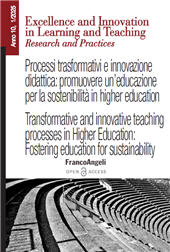Virtual English LAB : the Impact of Virtual Worlds on English Language Learning and Life Skills in Higher Education
23-44 p.
This study investigates the impact of immersive three-dimensional virtual environments on language learning and professional skills development in Higher Education. Grounded in constructivist and socio-cultural pedagogies, the research explores the implementation of the English LAB Virtual World FrameVR-based educational platform within two university-level English language laboratory courses for future primary school teachers. Adopting a quasi-experimental, mixed-methods design, the study analyzes learning outcomes, motivation, life skills, and perceived usability through validated tools: Cambridge Assessment-aligned tests (A2/B1), the MSLQ, the LiSST scale, and the SUS questionnaire. The experimental group, engaged in blended learning within the immersive environment, demonstrated statistically significant improvements in grammar, vocabulary, listening, and speaking skills ( 0.001), alongside enhanced intrinsic motivation and substantial growth in life skills domains such as critical thinking,
collaboration, and self-efficacy. Correlational analyses revealed strong associations between perceived usability, motivation, and transversal skills development. Qualitative data from focus groups further confirmed the transformative nature of immersive learning, emphasizing engagement, agency, and collaborative dynamics. The findings support the potential of Virtual Worlds to function not only as linguistic learning platforms but also as pedagogical ecosystems for developing 21st-century competencies. This research contributes to the evolving paradigm of the Eduverse, suggesting that virtual environments when purposefully designed and pedagogically structured can act as strategic enablers of inclusive, student-centered, and transformative learning in Higher Education. [Publisher's text]
This study investigates the impact of immersive three-dimensional virtual environments on language learning and professional skills development in Higher Education. Grounded in constructivist and socio-cultural pedagogies, the research explores the implementation of the English LAB Virtual World FrameVR-based educational platform within two university-level English language laboratory courses for future primary school teachers. Adopting a quasi-experimental, mixed-methods design, the study analyzes learning outcomes, motivation, life skills, and perceived usability through validated tools: Cambridge Assessment-aligned tests (A2/B1), the MSLQ, the LiSST scale, and the SUS questionnaire. The experimental group, engaged in blended learning within the immersive environment, demonstrated statistically significant improvements in grammar, vocabulary, listening, and speaking skills (p < 0.001), alongside enhanced intrinsic motivation and substantial growth in life skills domains such as critical thinking,
collaboration, and self-efficacy. Correlational analyses revealed strong associations between perceived usability, motivation, and transversal skills development. Qualitative data from focus groups further confirmed the transformative nature of immersive learning, emphasizing engagement, agency, and collaborative dynamics. The findings support the potential of Virtual Worlds to function not only as linguistic learning platforms but also as pedagogical ecosystems for developing 21st-century competencies. This research contributes to the evolving paradigm of the Eduverse, suggesting that virtual environments when purposefully designed and pedagogically structured –can act as strategic enablers of inclusive, student-centered, and transformative learning in Higher Education. [Publisher's text]
Fa parte di
Excellence and innovation in learning and teaching : research and practices : 10, 1, 2025-
Articoli dello stesso fascicolo (disponibili singolarmente)
-
Informazioni
Codice DOI: 10.3280/exioa1-2025oa20579
ISSN: 2499-507X
PAROLE CHIAVE
- Immersive Learning, Virtual Worlds, Language Education, Teacher Training, Life Skills


